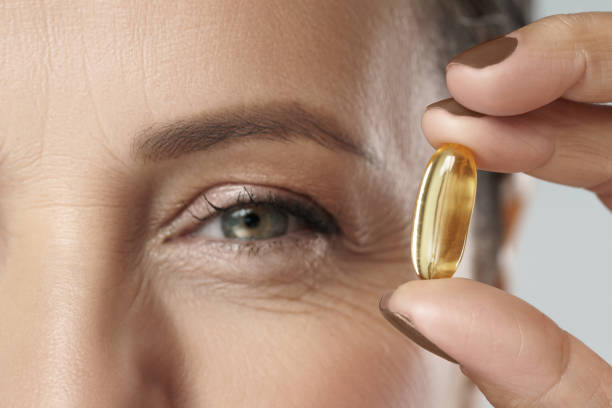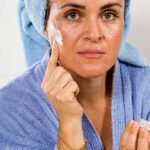Health Benefits of Vitamins
Health Benefits of Vitamins for Overall Physical Health Vitamins benefit skin health and beauty as they are essential for cell repair. They promote collagen synthesis, protect against environmental damage, and provide a radiant and youthful appearance.
These are the benefits of vitamins A, C, E, and D, which are especially important and beneficial for skin health due to their antioxidant properties, aid in collagen production, and boost immune function.
Benefits of Vitamins for Skin Care:

Vitamins have health benefits for skin care. The skin is the outermost protective layer of the body, acting as a natural barrier against external elements such as dust and pathogens. Maintaining healthy skin is very important to avoid skin problems.
A consistent skincare routine can address common skin problems like acne, blackheads, whiteheads, dark spots, and blemishes. Adequate skin hydration is essential for overall skin health, which can be achieved through adequate water intake.
Essential vitamins that are particularly beneficial for skin care include vitamins A, C, D, and E. Ensuring the intake of essential vitamins and minerals through your diet is crucial to maintaining healthy skin and overall health. Additionally, it’s worth noting that unusual skin symptoms can sometimes indicate an underlying vitamin deficiency.
Essential vitamins, healthy nutrients, and a daily skincare routine benefit skin health. These vitamins are important in skin care, as they are essential organic compounds for the body. They offer numerous benefits for the skin, promote skin health, fight signs of aging, and address issues like acne and blackheads while nourishing the skin. Trusted source
Vitamins are essential for the growth and repair of skin cells:

Vitamins are essential in maintaining the skin’s health and its overall beauty. First and foremost, vitamins are essential for the growth and repair of skin cells. They make essential proteins, such as collagen and elastin, that give the skin structure and elasticity. Collagen, in particular, is a critical factor in keeping skin firm, supple, and youthful.
Another critical aspect of vitamins is their ability to protect the skin from external damage, especially from ultraviolet (UV) radiation. Vitamins C and E, for example, have antioxidant properties that help protect the skin from the harmful effects of UV rays, such as premature aging, wrinkles, fine lines, and age spots.
Besides protection, vitamins also play a role in maintaining skin hydration and moisture. For example, vitamin B3 (niacin) is essential in maintaining the skin’s natural moisture barrier. It helps prevent dryness, oiliness, and skin conditions like eczema, ensuring the skin remains well-hydrated and supple. Trusted source
Vitamins are further involved in the skin’s healing processes:

Vitamin K, for example, aids wound healing by increasing blood clot formation and reducing the appearance of scars and bruises. This function is essential for maintaining an even and healthy skin tone.
Skin inflammation, a common problem for many people, can be reduced by specific vitamins. Vitamin E and D, known for their anti-inflammatory effects, can help soothe irritated skin and relieve conditions such as acne and eczema.
Vitamins also have a significant effect on skin tone and texture. Vitamin A, in the form of retinol, is known to improve skin texture, reduce the appearance of fine lines and wrinkles, and promote an even complexion. Trusted source
Additionally, vitamins play an essential role in collagen production, vitamin C being a prime example. Collagen synthesis, fueled by vitamin C, ensures the skin maintains its elasticity and resists sagging, combating age-related skin problems.
Another essential role of vitamins in skin health is protecting against free radicals. Antioxidant vitamins can neutralize free radicals and unstable molecules, which have the potential to damage skin cells and accelerate the aging process.
Specific vitamins shine through in the quest for a brighter complexion. Vitamin C and niacinamide, a form of vitamin B3, can help reduce the appearance of dark spots, hyperpigmentation, and uneven skin tone, contributing to a more radiant appearance.
Specific B vitamins are crucial for acne management. Vitamin B5, or pantothenic acid, helps control excess oil production and can reduce the severity of acne breakouts.
Importance and Benefits of Vitamins for Maintaining Healthy Skin:

Vitamins have numerous health benefits and are essential for maintaining skin health and combating various skin problems, including signs of aging. The benefits of vitamins are crucial for skin repair and overall well-being. Here, we explore the importance of these vitamin benefits in skin care:
- Vitamin A (Retinol)
Vitamin A, also known as retinol, is highly effective in treating wrinkles and is a critical ingredient in many skincare products. It promotes skin repair and healing. When using topical vitamin A (retinol), it’s essential to conduct a patch test to prevent potential skin irritation.
- Vitamin B Complex
B complex vitamins, including thiamine (B1), riboflavin (B2), niacin (B3), pantothenic acid (B5), pyridoxine (B6), biotin (B7), folic acid (B9), and cobalamins (B12), in total Contribute to skin health.
- Vitamin C (Ascorbic Acid)
Vitamin C, found primarily in citrus fruits, enhances antioxidant properties and offers various skincare benefits, including:
- Preventing dark circles around the eyes.
- Reducing under-eye circles.
- Improving skin elasticity and resilience.
- Stimulating collagen production.
- Preventing premature aging.
- Increasing skin smoothness.
- Preventing hyperpigmentation.
- Achieving skin hydration.
- Reducing inflammation in conditions like eczema and rosacea.
- Vitamin D (Calciferols)
Vitamin D, Usually referred to as the sunshine vitamin, supports skin health by:
- Reducing inflammation.
- It is used in creams for skin conditions such as eczema and vitiligo.
- We are offering protection against skin cancer.
- They are preventing pricing aging.
Vitamin E (Tocopherols and Tocotrienols) 
Vitamin E boasts antioxidant properties to combat aging and offers additional skincare benefits, including:
- Serving as an effective skin moisturizer.
- Providing a soothing effect.
- Reducing burns and inflammation.
- Promoting skin rejuvenation.
- Boosting collagen production.
Vitamin K (Phylloquinone and Menaquinones)
Vitamin K is vital in wound healing, reducing bruising and swelling due to its anti-inflammatory effects.
These vitamins are integral for maintaining skin health and addressing various skin concerns. Including them in your skincare routine and diet may help you achieve and maintain healthy, vibrant skin.
How to Use Vitamins for Skin Care?

A daily skin routine should include cleansing, scrubbing, washing, and moisturizing. Essential vitamins can be taken in any form, including diet, oral supplements, and topical products. A diet must include all the nutrients and vitamins for a healthy lifestyle. Vitamins are present in numerous fruits and vegetables.
A convenient form of taking vitamins is oral supplements. Most skin products contain vitamin A or retinol and are applied topically to nourish the skin and cause skin whitening. However, it is found that some of the products containing vitamin A or retinol might cause skin irritation. Vitamin deficiency causes various skin symptoms.
The symptoms of vitamin D deficiency are given below.
- Hyperpigmentation.
- Scaly patches.
- Dermatitis.
- Poor healing of skin wounds.
- Loss of hair.
- Abnormalities in nails.
- Dry and rough skin.
What Are the Benefits of Vitamins in Skin Care?

The vitamins have a lot of benefits for the skin. Skin whitening, hydration, skin repair, and other functions are obtained from vitamins.
Some of the benefits of vitamins in skin care are given below.
- Anti-aging properties are obtained from vitamin retinol, a vitamin C or ascorbic acid.
- Skin elasticity is improved with vitamin C or ascorbic acid.
- Skin damage is reversed with vitamin E.
- It also reduces inflammation. Dermatitis can be treated with vitamin E and vitamin D.
What Is the Risk Behind Vitamins in Skin Care?

Overdose or overconsumption of vitamins might cause specific problems. It is observed that particular vitamin over-usage causes adverse reactions.
Some of the side effects of vitamins are listed below.
- Excessive urination is called polyuria.
- Yellow-coloured skin changes.
- Staining of clothes.
- Hives.
- Skin irritation.
- Illness.
- Prostate cancer with an increased dose of vitamin E.
- Drug interactions.
What Are Skin Care Foods? 
Specific vitamins can be consumed in the diet. Essential vitamins are present in foods, and a healthy diet containing vitamins and other nutrients promotes good skincare.
Some foods contain essential vitamins that protect the skin:
It has the following benefits for the skin:
- Salmon.
- Avocados.
- Carrot.
- Oranges.
- Watermelon.Olive oil.
- Almonds.
- Kale.
- Walnut.
- Tomatoes.
- Eggs.
- Milk.
- Pepper.
- Berries.
- Broccoli.
- Dark chocolate.
- Spinach.
- Nuts.
- Meat and grains.
- Pumpkins.
Although topical skin care products can deliver vitamins directly to the skin, a balanced diet, proper hydration, sun protection, and a healthy lifestyle are important in achieving and maintaining beautiful skin. Vitamins are essential for skin health and beauty.
They play an essential role in cell growth, protection, hydration, and wound healing; they also reduce inflammation, improve texture, and increase collagen production.
It also helps improve free radical defense and evens skin tone and acne problems: their multifaceted role in managing and maintaining the skin’s protective barrier. Vitamins such as vitamin E and essential fatty acids such as omega-6 and omega-3 are essential for maintaining the skin’s barrier function.
This protective barrier is essential for protecting the skin from environmental stressors and controlling moisture loss, promoting overall skin health. To ensure safe and effective use, it is advisable to consult a healthcare professional or dermatologist before adding vitamin supplements to your routine.
Benefits of Regular Exercise for Older Adults













